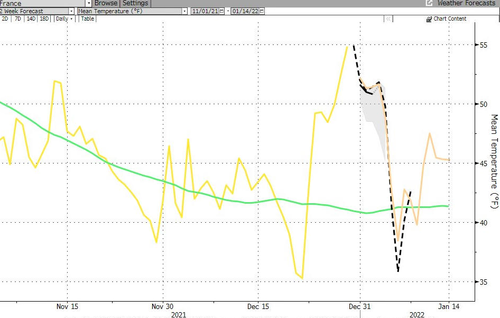The intro to a post on the Texas power grid failure last February (here at Climateer Investing, we recycle!):
A few days ago I mentioned one of the quirks of the European carbon markets, the lower the temperature goes the higher the price for a EUA (one tonne of CO2). Another quirk is that during very cold weather, caused by a high pressure area sitting over a region, the wind doesn't blow. Meaning the wind turbines don't turn. This has happened in Britain and in Texas as well, sometimes for days on end.
And there are other quirks, maybe I shouldn't call them quirks because it is basic engineering....
And today's headline story from ZeroHedge:
France's electricity grid is coming under strain, and the next cold snap could be devastating for the country as energy-intensive manufacturers would experience reduced power, according to a new report published by French power grid operator Reseau de Transport d'Electricite (RTE).
RTE said due to the lack of wind and nuclear power generation. The next cold snap would force it to cut electricity to energy-intensive companies to stabilize the grid. There's even the possibility widespread rolling blackouts could be implemented for two hours to mitigate grid collapse during peak energy demand.
The good news is that weather forecasting models provided by Bloomberg don't show an imminent cold blast for the first half of January.
....MORE"Based on the latest forecast for January, such meteorological events -- including a severe cold snap -- seem very unlikely for the start of the month, and less likely for the rest of the month," RTE said. "Hence, the risk of power cuts is essentially ruled out at least for the start of January."
Mild temperatures and a flotilla of liquefied natural gas tankers have been a temporary relief for Europe, sending Dutch TTF natural gas and power prices lower in the last week.
France's grid remains under pressure but not as bad as last week when day-ahead power prices rose to the highest level since 2009 and have since halved. Prices remain at extremely high levels.

